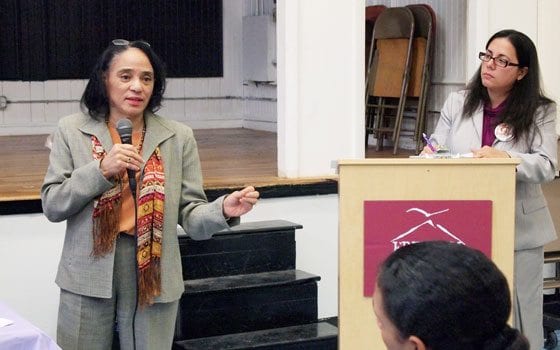
School Superintendent Carol Johnson will seek input from parents across the city next year as the School Department embarks on an attempt to overhaul the city’s school assignment process.
Speaking during a community forum on school assignment at the Freedom House Saturday, Johnson said the School Department would likely begin the conversation within the next six months.
“There are diverse voices and not everyone agrees,” she said during the forum, which was sponsored by the Boston Parent Organizing Network (BPON). “It’s very important that we come up with a plan and bring it before the community.”
The current school assignment process has been roundly criticized by parents in neighborhoods throughout the city. While many in the white community, including many city councilors, advocate for a return to a neighborhood schools system, where seats in any given school would be reserved for children who live in close proximity, many parents in the black community say they want better choices for their children.
Under the current system, the city is divided into three zones: North, East and West. Half the seats in elementary and middle schools are reserved for children who live within two miles of the school, the other half for parents who live anywhere else in the zone. Parents list their choices for their children’s assignments, then are selected by lottery.
Competition for the better-performing schools can be fierce. And living in close proximity to underperforming schools can make the school assignment process all the more frustrating.
“I want choices,” said Kim Banks, whose daughter is in the 5th grade at the Trotter School. “I’m not going to send my daughter just anywhere. I’m not crazy about the Dearborn.”
But because there are more students than seats in Roxbury and Dorchester, parents in the black and Latino communities often face fewer choices. A neighborhood school is not an option when there aren’t enough seats in the neighborhood school.
At Saturday’s meeting, Johnson said the primary focus for the School Department will continue to be on improving the quality of education in all of the city’s schools.
“I don’t want [school assignment] to distract us from making sure there is a great teacher in every classroom,” she said.
Johnson told attendees that her administration has already made substantial progress.
“Over the last two years, we have 4,000 more students attending schools that are higher performing,” she said.
The School Department achieved its gains in part by increasing the number of seats at high performing schools like the New Mission Charter School, Fenway High School and Another Course to College, according to Johnson.
Johnson said she is not entering into the debate around school assignment with any pre-conceived notions about where the processes will end.
“I don’t have an idea,” she said. “The only idea I have is what’s on the table right now — three zones. I know there are parents who want neighborhood schools. I know that in some neighborhoods they’re not convinced they have the right schools for their children.”
BPON Executive Director Myriam Ortiz said she was happy Johnson is looking at the school assignment policy, but added that her organization is also looking at how to make improvements to the current system.
Many of those in attendance at the meeting had children with special education needs or who are English language learners — two populations Ortiz says are not well served by the current school assignment practices.
Ortiz cited as an example the department’s practice of not assigning students with special education needs to advanced work classes, even if they pass exams for the classes.
“Students with disabilities have the right to participate in the least restrictive environment,” she said. “If they have disabilities, they need to have access to the same curriculum that any other student has.”
Ortiz also said parents working with BPON complain frequently about the assignment system’s practice of administratively assigning students to schools when they do not receive any of their assignment choices.
“Their computer administratively assigns students to the school closest to their home,” she said. “Not surprisingly, there’s a high number of students who are administratively assigned to underperforming schools. We hope that is resolved under the new student assignment process.”







